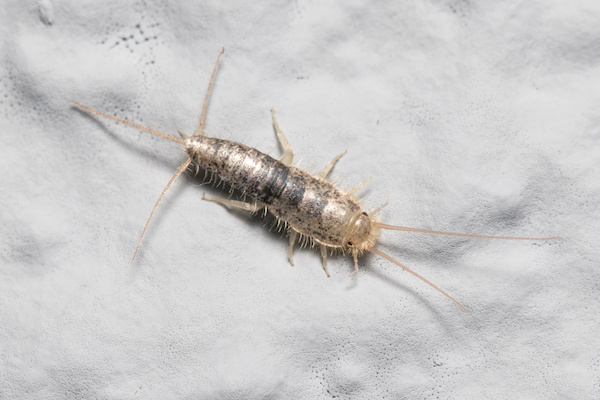
As Raleigh homeowners, we face challenges from household pests, particularly silverfish. With their nocturnal habits and penchant for consuming various materials, these insects can give you a run for your money!
But are there at-home methods that can keep these pests at bay? Enter vinegar!
Keep reading to learn more about silverfish and vinegar, particularly if this DIY option can truly eliminate these invading pests. Plus, don’t forget, for targeted pest control solutions in the Raleigh, North Carolina, area, contact Innovative Pest Solutions!
Everything You Should Know About Silverfish
Silverfish are small, wingless insects that infest homes to consume various materials. Hey, they’re not picky! Take a look at their diet preferences and some prevention tips that can help make your home a fortress against pests.
Diet
Silverfish are night owls, thriving in dark and humid spaces. But what truly makes them unique? They can dine on a wide-ranging menu.
These pests have a particular craving for carbohydrates, with sugars and starches topping their list. They have an eclectic taste, chowing down on materials like paper, cardboard, fabrics, wallpaper glue, and even munching on food such as grains, cereals, and pet food.
These little critters don’t stop at carbs – they’re also fans of proteins. Alongside carbohydrates, silverfish gobble up dead insects and skin flakes. They might even nibble on book bindings or leather items that carry traces of protein residues.
Even more surprising is their knack for digesting cellulose, a complex carbohydrate in plant materials. This unique ability allows silverfish to feast on paper, glue, and specific fabrics.
So, whether it’s your pantry, old books, or even your wallpaper, silverfish have a varied palate that keeps them quite the adaptable diners.
Indoor Entry
Silverfish can enter indoor spaces through various means:
- Natural Entry: Silverfish are moisture-dependent insects often found in damp areas. They might come indoors through gaps, cracks, and openings around windows, doors, and utility pipes.
- Ventilation Systems: Silverfish can come indoors through ventilation systems, especially if these systems are not adequately filtered or maintained.
- Infested Items: If you bring old books, cardboard boxes, or stored clothing from other locations, you could inadvertently introduce silverfish to your home.
- Humid Environments: Silverfish are attracted to areas with high humidity levels. Basements, bathrooms, kitchens, and attics are familiar places where they might establish themselves if conditions are favorable.
Prevention and Control
To prevent or control silverfish infestations:
- Reduce Humidity: We all know how humid North Carolina can get! Be sure to keep your home well-ventilated and use dehumidifiers in damp areas to make the environment less appealing to silverfish.
- Seal Entry Points: Seal cracks, gaps, and openings around windows, doors, and utility pipes to minimize their access points.
- Store Items Properly: Use airtight containers to store food items and other materials that silverfish might be attracted to.
- Regular Cleaning: Regularly clean and vacuum your home, paying attention to areas where crumbs, paper scraps, or other potential food sources might accumulate.
- Eliminate Clutter: Declutter your living spaces to reduce potential hiding places for silverfish.
- Pest Control: If an infestation occurs, consider using traps or consult pest control professionals for safe and effective solutions.
If you suspect an infestation or want to take preventive measures, it’s a good idea to address the issue promptly to minimize its impact on your home and belongings.
Silverfish and Vinegar
Numerous homeowners grappling with silverfish often seek natural methods to prevent and eliminate these pests.

Vinegar is a common household item known for its versatility, but can it take on the challenge of dealing with silverfish? Let’s dive into the connection between silverfish and vinegar to see if it can help and its limitations.
Vinegar’s Repellent Properties
Vinegar, mainly made up of acetic acid, has a strong smell that can discourage pests like ants, flies, and roaches from sticking around. However, vinegar may not make the cut in terms of silverfish control.
Silverfish are adaptable and skilled at surviving, habitually residing in dark, damp places and eating almost anything they find. Though vinegar’s smell can briefly chase them away, these bugs are clever at finding food and hiding spots.
So, are silverfish and vinegar a match made in heaven? Using vinegar might work for a little while. But here’s the catch: once the vinegar smell disappears, the silverfish may return since vinegar doesn’t have a lasting effect.
Enhancing Vinegar’s Effectiveness
While silverfish and vinegar alone might not provide a comprehensive solution, you can incorporate it into a multifaceted approach to silverfish control:
- Cleaning: Regular cleaning and vacuuming can eliminate food particles that attract silverfish.
- Sealing Entry Points: Blocking potential entryways by sealing cracks, gaps, and openings can stop silverfish from infiltrating your living spaces.
- Reducing Humidity: Silverfish thrive in damp environments. Use dehumidifiers and improve your home’s ventilation to create less favorable conditions.
- Proper Food Storage: Using airtight containers to store food items can limit silverfish access to potential nourishment.
- Professional Guidance: For persistent infestations, seeking advice from pest control professionals is advisable. They can offer insight into effective and safe strategies tailored to your situation.
Vinegar can briefly keep silverfish away but can’t fully prevent or get rid of them. However, relying on a knowledgeable pest professional can prevent these pests from causing more problems.
For stress-free silverfish control in North Carolina, contact us here at Innovative Pest Solutions! We’re proud to service Raleigh and the surrounding areas.





